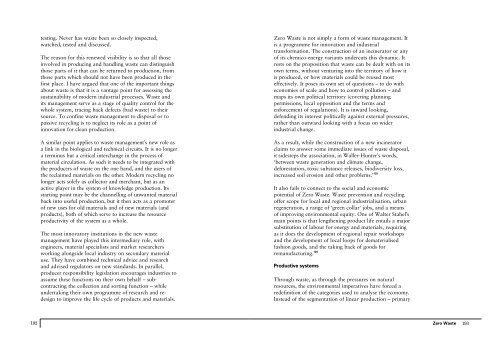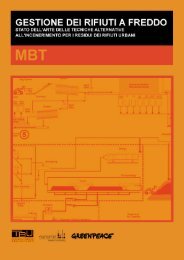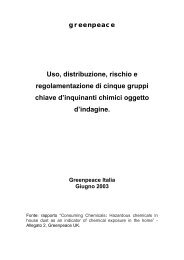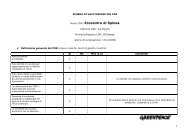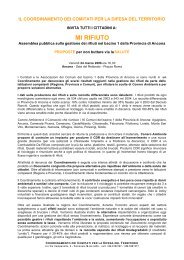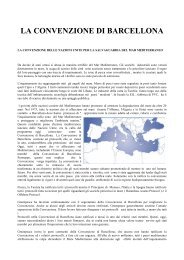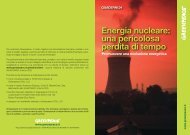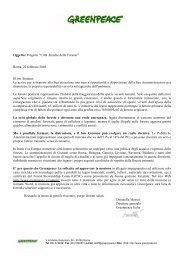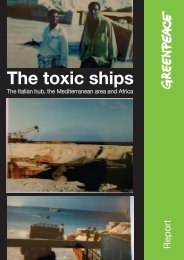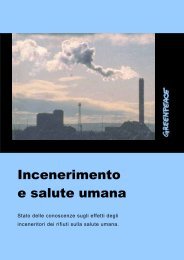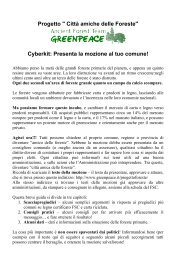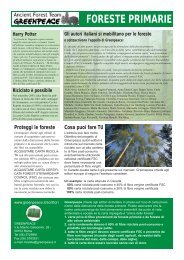Zero Waste by Robin Murray, Greenpeace Environmental Trust 2002
Zero Waste by Robin Murray, Greenpeace Environmental Trust 2002
Zero Waste by Robin Murray, Greenpeace Environmental Trust 2002
You also want an ePaper? Increase the reach of your titles
YUMPU automatically turns print PDFs into web optimized ePapers that Google loves.
testing. Never has waste been so closely inspected,<br />
watched, tested and discussed.<br />
The reason for this renewed visibility is so that all those<br />
involved in producing and handling waste can distinguish<br />
those parts of it that can be returned to production, from<br />
those parts which should not have been produced in the<br />
first place. I have argued that one of the important things<br />
about waste is that it is a vantage point for assessing the<br />
sustainability of modern industrial processes. <strong>Waste</strong> and<br />
its management serve as a stage of quality control for the<br />
whole system, tracing back defects (bad waste) to their<br />
source. To confine waste management to disposal or to<br />
passive recycling is to neglect its role as a point of<br />
innovation for clean production.<br />
A similar point applies to waste management’s new role as<br />
a link in the biological and technical circuits. It is no longer<br />
a terminus but a critical interchange in the process of<br />
material circulation. As such it needs to be integrated with<br />
the producers of waste on the one hand, and the users of<br />
the reclaimed materials on the other. Modern recycling no<br />
longer acts solely as collector and merchant, but as an<br />
active player in the system of knowledge production. Its<br />
s t a rting point may be the channelling of unwanted material<br />
back into useful production, but it then acts as a pro m o t e r<br />
of new uses for old materials and of new materials (and<br />
p roducts), both of which serve to increase the re s o u rc e<br />
p roductivity of the system as a whole.<br />
The most innovatory institutions in the new waste<br />
management have played this intermediary role, with<br />
engineers, material specialists and market researchers<br />
working alongside local industry on secondary material<br />
use. They have combined technical advice and research<br />
and advised regulators on new standards. In parallel,<br />
producer responsibility legislation encourages industries to<br />
assume these functions on their own behalf – subcontracting<br />
the collection and sorting function – while<br />
undertaking their own programme of research and redesign<br />
to improve the life cycle of products and materials.<br />
<strong>Zero</strong> <strong>Waste</strong> is not simply a form of waste management. It<br />
is a programme for innovation and industrial<br />
transformation. The construction of an incinerator or any<br />
of its chemico-energy variants undercuts this dynamic. It<br />
rests on the proposition that waste can be dealt with on its<br />
own terms, without venturing into the territory of how it<br />
is produced, or how materials could be reused most<br />
effectively. It poses its own set of questions – to do with<br />
economies of scale and how to control pollution – and<br />
maps its own political territory (covering planning<br />
permissions, local opposition and the terms and<br />
enforcement of regulations). It is inward looking,<br />
defending its interest politically against external pressures,<br />
rather than outward looking with a focus on wider<br />
industrial change.<br />
As a result, while the construction of a new incinerator<br />
claims to answer some immediate issues of waste disposal,<br />
it sidesteps the association, in Waller-Hunter’s words,<br />
‘between waste generation and climate change,<br />
deforestation, toxic substance releases, biodiversity loss,<br />
increased soil erosion and other problems.’ 125<br />
It also fails to connect to the social and economic<br />
potential of <strong>Zero</strong> <strong>Waste</strong>. <strong>Waste</strong> prevention and recycling<br />
offer scope for local and regional industrialisation, urban<br />
regeneration, a range of ‘green collar’ jobs, and a means<br />
of improving environmental equity. One of Walter Stahel’s<br />
main points is that lengthening product life entails a major<br />
substitution of labour for energy and materials, requiring<br />
as it does the development of regional repair workshops<br />
and the development of local loops for dematerialised<br />
fashion goods, and the taking back of goods for<br />
remanufacturing. 126<br />
Productive systems<br />
Through waste, as through the pressures on natural<br />
resources, the environmental imperatives have forced a<br />
redefinition of the categories used to analyse the economy.<br />
Instead of the segmentation of linear production – primary<br />
192<br />
<strong>Zero</strong> <strong>Waste</strong> 193


